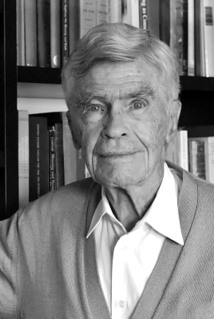Mario Bunge facts for kids
Quick facts for kids
Mario Bunge
|
|
|---|---|

Bunge in 2007
|
|
| Born | September 21, 1919 Buenos Aires, Argentina
|
| Died | February 24, 2020 (aged 100) Montreal, Quebec, Canada
|
| Education | National University of La Plata (PhD, 1952) |
| Era | Contemporary philosophy |
| Region | Western philosophy |
| School | Analytic philosophy Scientific realism Emergentism |
|
Main interests
|
Philosophy of science Philosophy of physics Pseudoscience |
|
Notable ideas
|
Systemics, sociotechnology |
|
Influences
|
|
Mario Augusto Bunge (born September 21, 1919 – died February 24, 2020) was an important thinker from Argentina and Canada. He was both a physicist (someone who studies how the world works at a basic level) and a philosopher (someone who thinks deeply about big questions like knowledge, reality, and values).
His ideas combined several important ways of thinking. These included scientific realism (believing that science describes a real world), systemism (looking at things as connected systems), materialism (the idea that everything is made of matter), and emergentism (the idea that new, complex things can arise from simpler parts).
Bunge believed in "exact philosophy," which means using clear, logical thinking. He often spoke out against ideas he saw as not based on science, especially pseudoscience (fake science).
Contents
About Mario Bunge's Life
Mario Bunge was born on September 21, 1919, in a place called Florida Oeste, near Buenos Aires, Argentina. His mother, Marie Herminie Müser, was a nurse from Germany. His father, Augusto Bunge, was an Argentinian doctor and a politician who believed in socialism.
Mario was their only child. He grew up in a happy home without strict religious rules. He lived with his wife, Marta Cavallo, a mathematician, in Montreal, Canada, since 1966. They were married for over 60 years. Mario had four children: Carlos F., Mario A. J., Eric R., and Silvia A.
Mario Bunge's Education and Career
Mario Bunge studied at the National University of La Plata in Argentina. He earned his PhD in physics and math in 1952. He became a professor of theoretical physics and philosophy. He taught in Argentina from 1956 to 1966.
In 1956, he became well-known at a philosophy meeting in Chile. Later, in 1966, he moved to McGill University in Montreal, Canada. He taught there as a professor until he retired at age 90.
Mario Bunge lived a very long life. He turned 100 years old in September 2019. He passed away in Montreal, Canada, on February 24, 2020, at the age of 100. People who knew him said he was a very confident person who always followed his strong beliefs about truth, science, and fairness.
Mario Bunge's Political Views
Mario Bunge believed in a mix of left-wing liberal and democratic socialist ideas. This means he supported freedom for individuals but also believed in fairness and helping everyone in society. He was inspired by thinkers like John Stuart Mill.
He also supported the idea of a United Nations Parliamentary Assembly. This group wants to make the United Nations more democratic and fair for all countries.
Mario Bunge's Work and Ideas
Mario Bunge was a very busy writer. He wrote over 400 papers and 80 books! His most famous work is a huge series of books called Treatise on Basic Philosophy. It has eight volumes and covers many deep philosophical topics.
Understanding His Philosophy
Bunge's work was based on several key ideas:
- Systemism: He believed that everything in the world is part of a system, where different parts work together.
- Emergentism: This idea suggests that new, complex things can appear from simpler parts, like how a mind can emerge from a brain.
- Rationalism: He thought that reason and logic are the best ways to understand the world.
- Scientific Realism: He strongly believed that science helps us understand the real world, not just our ideas about it.
- Materialism: This is the idea that everything, including our thoughts, is based on physical matter.
Mario Bunge was well-known for saying that psychoanalysis (a type of therapy) was a pseudoscience. He believed it wasn't based on strong scientific evidence. He also shared his thoughts on the ideas of other famous scientists and philosophers.
His Ideas on Social Science
Mario Bunge also wrote a lot about how we should study human societies. He believed in an approach called systemism. This means that to understand society, we should look at how all its parts connect and work together. He thought it was important to find the "mechanisms" or processes that cause changes in society.
Awards and Honors
Mario Bunge received many awards during his long career.
- Guggenheim Fellowship (1971)
- The Premio Príncipe de Asturias (Prince of Asturias Award) for Communication and Humanities (1982)
- Fellow of the American Association for the Advancement of Science (AAAS) (1984)
- Fellow of the Royal Society of Canada (1992)
- The Ludwig von Bertalanffy Award in Complexity Thinking (2014)
He also received 21 honorary doctorates and four honorary professorships from universities around the world. In 2011, he was included in the "Science Hall of Fame" by the journal Science.
See also
 In Spanish: Mario Bunge para niños
In Spanish: Mario Bunge para niños
- Dialectic#Criticisms § Notes
- List of people from Montreal
- Scientism#Pro-scientism § Notes
 | Leon Lynch |
 | Milton P. Webster |
 | Ferdinand Smith |

